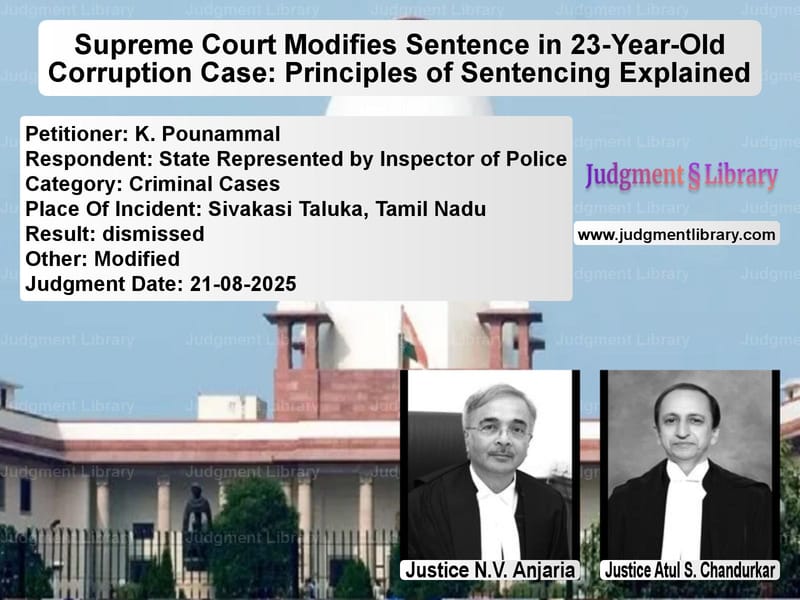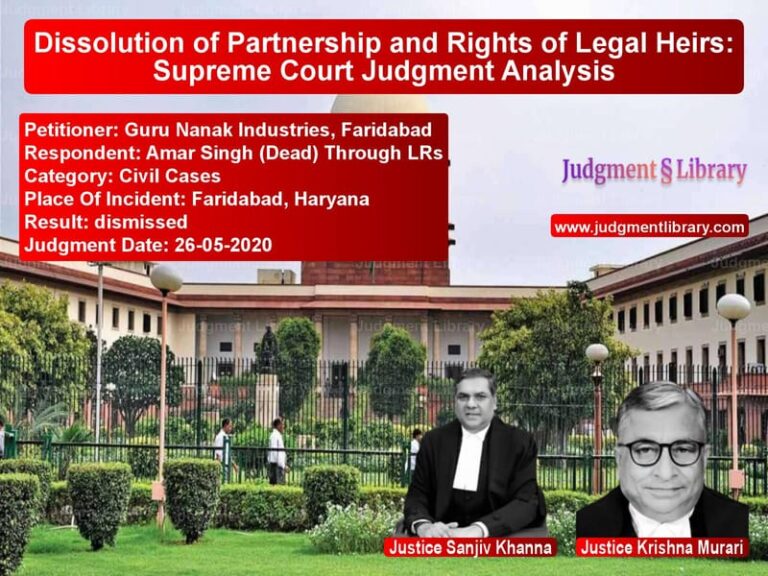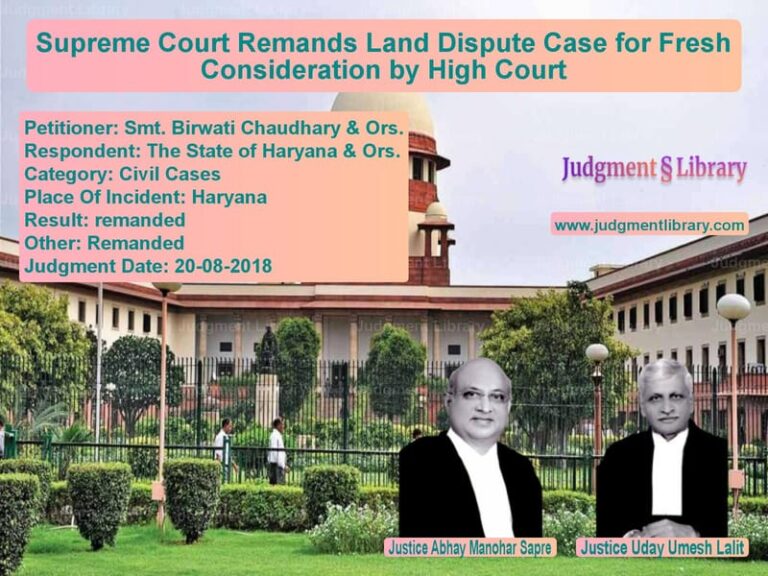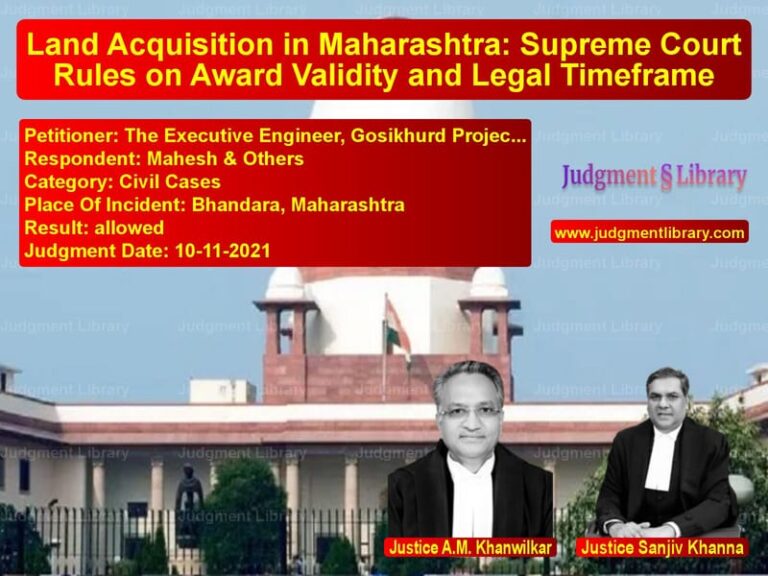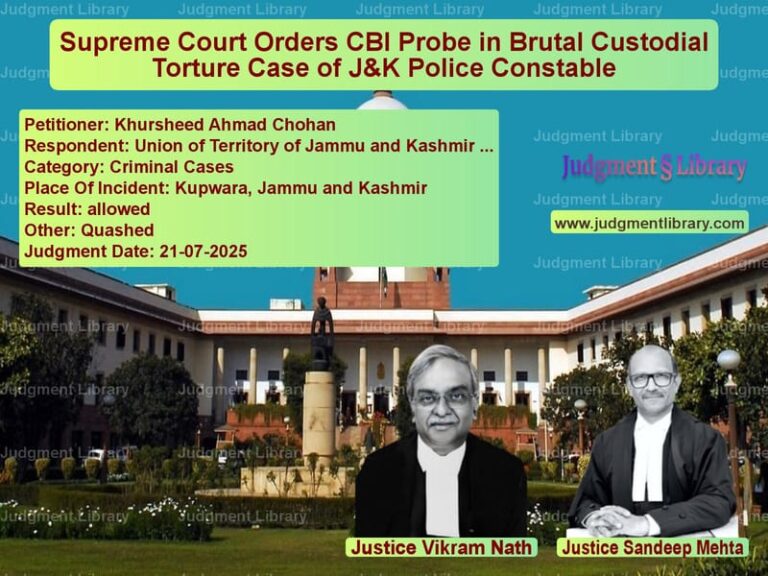Supreme Court Modifies Sentence in 23-Year-Old Corruption Case: Principles of Sentencing Explained
In a significant judgment that explores the delicate balance between conviction and sentencing in criminal cases, the Supreme Court of India has modified the punishment in a corruption case that had been pending for over two decades. The case involved K. Pounammal, a former Central Excise Inspector who had been convicted for demanding and accepting a bribe of ₹300 in 2002, and whose legal battle had stretched across 23 years, touching upon fundamental questions about justice, punishment, and the human cost of protracted legal proceedings.
The case originated in September 2002 when a supervisor from Parani Match Factory in Sivakasi Taluka approached the authorities with a complaint that Pounammal, who was handling the factory’s application for a central excise registration certificate, had demanded illegal gratification of ₹300. The prosecution alleged that when the complainant refused to pay the bribe amount despite being pressured and threatened, the release of the certificate was deliberately delayed. This led to the filing of a formal complaint on September 21, 2002, setting in motion a legal process that would span more than two decades.
After obtaining sanction from the Competent Authority in March 2003, the charge-sheet was filed, and the case proceeded to trial before the Special Judge for CBI cases in Madurai. The trial court convicted Pounammal under Section 7 and Section 13(2) read with Section 13(1)(d) of the Prevention of Corruption Act, 1988, sentencing her to rigorous imprisonment for six months and one year respectively for the two offences, along with fines. The Madras High Court subsequently confirmed this conviction and sentence in August 2010, leading to the final appeal before the Supreme Court.
The Change in Legal Strategy
In a strategic shift during the Supreme Court hearing, the appellant’s counsel, Mr. M. A. Chinnasamy, made a significant concession. “In course of hearing today, learned advocate for the appellant stated before the Court upon instructions from the appellant that he gives up the challenge to the conviction recorded against the appellant and that confines the appeal in respect of the sentence part only.” This decision narrowed the legal battle to the question of whether the sentence imposed was appropriate given the extraordinary circumstances of the case.
The counsel pleaded for sentence reduction, “He requested the court for reduction of the sentence to further submit that the period of sentence already undergone may be treated as adequate sentence while maintaining the conviction. He submitted that the complaint was filed as back as on 23.09.2002 and 23 years have passed by since the occurrence of the incident where appellant-lady was alleged to have asked for the illegal gratification of ₹300.”
The Legal Precedents on Sentencing
The Supreme Court, in its judgment delivered by Justice N.V. Anjaria, extensively reviewed the legal principles governing sentencing in corruption cases. The Court referenced several important precedents where sentences had been reduced due to the passage of time and other mitigating circumstances.
In M.W. Mohiuddin vs. State of Maharashtra, the Court had maintained the conviction but reduced the sentence, observing that “…. All these years the appellant has undergone the agony of criminal proceedings until now and he has also lost his job and has a large family to support. It is also stated that he has become sick and infirm. He has been in jail for some time. For all these special reasons, while confirming the conviction of the appellant, we reduce the sentence of imprisonment to the period already undergone. However, we confirm the sentence of fine with default clause…..”
Similarly, in Bechaarbhai S. Prajapati v. State of Gujarat, involving a Police Sub-Inspector who demanded money for allowing a luxury bus carrying a marriage party to proceed, the Court reduced the sentence to the period already undergone, noting that the occurrence had taken place nearly seven years back and the appellant had suffered custody for more than six months.
The Court also referenced Gulmahmad Abdulla Dall vs. State of Gujarat, where it observed that “The incident, in question, took place as back as on 29-6-1987. Almost 27 years have passed by. All these years, the appellants must have suffered tremendous mental trauma and anguish. The appellants have lost their jobs and all retiral benefits.”
The Philosophy of Sentencing
The judgment delves deep into the philosophical underpinnings of criminal sentencing, noting that “The conviction and sentence have their respective realms. While the conviction would be recorded on the basis of evidence adduced before the Court which would establish the implication of the accused in the offence, the guilty person or the convicted when to be awarded a sentence, a host of factors would operate to govern.”
The Court explained that “In determining the final sentence and the nature thereof, variety of factors that would operate would include the intervening time between the commission of offence and the actual award of the sentence, age of the accused, the stress which he or she might have suffered because of passage of time during each case has remained pending and undecided, the family circumstance and such other factors, without becoming exhaustive.”
The judgment elaborates on the different theories of sentencing: “The process of sentencing by the courts is guided by theories such as punitive, deterrent or reformative. Each school of thought has its own object and purpose to explain awarding of sentence and its utility. Amongst these theories, reformative approach has become increasingly acceptable to the modern jurisprudence. Reformation is something always considered progressive. When there are mitigating circumstances, the court would lean towards reducing of the sentence. The focus would be on the crime, and not on the criminal. The society and system would nurture the guilt with positivity, while selecting the sentence.”
The Human Cost of Protracted Litigation
The Court made poignant observations about the psychological impact of prolonged legal proceedings: “The prolongation of a criminal case for an unreasonable period is in itself a kind of suffering. It amounts to mental incarceration for the person facing such proceedings. For a person who is convicted and who has appealed against his or her conviction and sentence and who everyday awaits the fate of litigation, spends time in distress. In the present-day system of administration of justice, in which proceedings have often go on protracted unreasonably and therefore unbearably, the passage of long time itself makes the person suffer a mental agony.”
The Court’s Final Decision
Considering all the circumstances, including that “the incident had occurred more than 22 years ago and that the age of the widow appellant is 75 years who stays alone,” the Court concluded that “the Court finds it appropriate that she may not be made to undergo the imprisonment again. In the totality of the facts and circumstances, the imprisonment already undergone by her is treated to be adequate sentence.”
The Court accordingly “reduced to the actual undergone” the sentence while increasing the fine to ₹25,000 over and above the originally imposed amount. The Court specified that “The amount of fine shall be paid on or before 10th September, 2025” and warned that “if the appellant fails to pay the amount of fine as directed above within the stipulated time, the original order of sentence shall revive and operate rendering the appellant liable to surrender before the authorities concerned.”
This judgment represents a significant development in Indian criminal jurisprudence, particularly in the realm of sentencing law. It acknowledges that while conviction must be based strictly on evidence and legal principles, sentencing requires a more nuanced approach that considers the human dimension of justice. The Court’s recognition that prolonged litigation itself constitutes a form of punishment marks an important evolution in judicial thinking, balancing the need to uphold the law with compassion and recognition of the realities of human suffering caused by extended legal battles.
The decision also underscores the Supreme Court’s increasing willingness to consider reformative approaches to sentencing, particularly in cases involving elderly accused persons, small amounts of bribe money, and extraordinary delays in the judicial process. While maintaining the conviction to uphold the principle that corruption cannot be tolerated, the modified sentence acknowledges that justice must sometimes be tempered with mercy, especially when the process of justice itself has inflicted significant suffering on the accused.
Petitioner Name: K. Pounammal.Respondent Name: State Represented by Inspector of Police.Judgment By: Justice N.V. Anjaria, Justice Atul S. Chandurkar.Place Of Incident: Sivakasi Taluka, Tamil Nadu.Judgment Date: 21-08-2025.Result: dismissed.
Don’t miss out on the full details! Download the complete judgment in PDF format below and gain valuable insights instantly!
Download Judgment: k.-pounammal-vs-state-represented-by-supreme-court-of-india-judgment-dated-21-08-2025.pdf
Directly Download Judgment: Directly download this Judgment
See all petitions in Fraud and Forgery
See all petitions in Other Cases
See all petitions in Judgment by N.V. Anjaria
See all petitions in Judgment by Atul S. Chandurkar
See all petitions in dismissed
See all petitions in Modified
See all petitions in supreme court of India judgments August 2025
See all petitions in 2025 judgments
See all posts in Criminal Cases Category
See all allowed petitions in Criminal Cases Category
See all Dismissed petitions in Criminal Cases Category
See all partially allowed petitions in Criminal Cases Category

